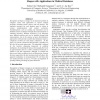Free Online Productivity Tools
i2Speak
i2Symbol
i2OCR
iTex2Img
iWeb2Print
iWeb2Shot
i2Type
iPdf2Split
iPdf2Merge
i2Bopomofo
i2Arabic
i2Style
i2Image
i2PDF
iLatex2Rtf
Sci2ools
117
click to vote
CBMS
2006
IEEE
2006
IEEE
Efficient Rotation Invariant Retrieval of Shapes with Applications in Medical Databases
Recognition of shapes in images is an important problem in computer vision with application in various medical problems, including robotic surgery and cell analysis. The similarity measures for such purpose must be robust to various transformations and modest occlusions. Transformations, such as scaling and translation can be handled easily by techniques through data representations or similarity measures. Rotation invariance is an inherently more difficult problem and can be handled through data representation, but at the expense of poor discrimination. Approaches which provide excellent discrimination require a complexity of O(n3 ) for each shape comparison. In this paper, we present a framework that provides a speedup over the slow but accurate approaches. The algorithm is inspired by the iterative deepening framework in artificial intelligence, by examining the data at increasingly fine levels of approximation until it is either considered irrelevant or submits to the full calcula...
CBMS 2006 | Data Representation | Medical Imaging | Similarity Measures | Various Medical Problems |
Related Content
| Added | 10 Jun 2010 |
| Updated | 10 Jun 2010 |
| Type | Conference |
| Year | 2006 |
| Where | CBMS |
| Authors | Selina Chu, Shrikanth S. Narayanan, C. C. Jay Kuo |
Comments (0)

